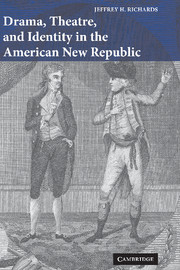Book contents
- Frontmatter
- Contents
- Acknowledgements
- Introduction
- 1 American identities and the transatlantic stage
- PART I Staging revolution at the margins of celebration
- 2 Revolution and unnatural identity in Crèvecoeur's “Landscapes”
- 3 British author, American text: The Poor Soldier in the new republic
- 4 American author, British source: writing revolution in Murray's Traveller Returned
- 5 Patriotic interrogations: committees of safety in early American drama
- 6 Dunlap's queer André: versions of revolution and manhood
- PART II Coloring identities: race, religion, and the exotic
- PART III Theatre, culture, and reflected identity
- Notes
- Bibliography
- Index
3 - British author, American text: The Poor Soldier in the new republic
Published online by Cambridge University Press: 22 September 2009
- Frontmatter
- Contents
- Acknowledgements
- Introduction
- 1 American identities and the transatlantic stage
- PART I Staging revolution at the margins of celebration
- 2 Revolution and unnatural identity in Crèvecoeur's “Landscapes”
- 3 British author, American text: The Poor Soldier in the new republic
- 4 American author, British source: writing revolution in Murray's Traveller Returned
- 5 Patriotic interrogations: committees of safety in early American drama
- 6 Dunlap's queer André: versions of revolution and manhood
- PART II Coloring identities: race, religion, and the exotic
- PART III Theatre, culture, and reflected identity
- Notes
- Bibliography
- Index
Summary
Crèvecoeur's manuscript scenes notwithstanding, the majority of American-authored texts published as plays during the Revolution, all intended for the closet, supported the patriot side or took no direct stand against the whigs or the war. Except for the possibility of private readings or as yet unknown or unconfirmed amateur productions, these plays were not performed as scripts for the stage. They enacted their roles in the ideological and propaganda battles fought in print, have their place in American drama history, but made little immediate contribution to the theatre of the new republic. During the war, of course, few patriots had contact with the stage, unless they happened to be in British-occupied cities; Washington's famous production of Cato at Valley Forge is only the exception that proves the general case. This is not to say that such a production is unimportant; as Randall Fuller has shown, the Valley Forge Cato plays against the Philadelphia spectacle mounted by the British military, the Meschianza, in a number of symbolic ways. But in large measure, when whigs concerned themselves with theatre, it had more to do with vehicle than tenor, the figure than the literal boards. Once the war was over, the more radical whigs sought to limit theatre altogether, but for others, there was the sympathetic question: What would be shown? The answer came quickly enough.
- Type
- Chapter
- Information
- Publisher: Cambridge University PressPrint publication year: 2005



